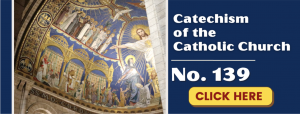Memorial of Saints John de Brébeuf and Isaac Jogues,
Priests, and Companions, Martyrs


MONDAY, OCTOBER 19th Lk. 12: 13-21 “You fool, this night your life will be demanded of you; and the things you have prepared, to whom will they belong.”
- Jesus says to us, “Thus will it be for the one who stores up treasure for himself but is not rich in what matters to God.” We overcome a vice – greed, by practicing the opposite virtue – generosity.
- John Chrysostom speaks strongly and directly to this parable: “Not to share one’s wealth with the poor is to steal from them and to take away their livelihood. It is not our own goods which we hold, but theirs”.
- Pope Francis’ explanation of Almsgiving: “It is a sign of gratuity because alms are given to someone from whom you would not expect to receive anything in return. Gratuity should be one of the characteristics of a Christian, who, aware of having received everything from God freely, that is without any merit, learns to give to others freely. Almsgiving helps us to live the gratuitousness of the gift, which is freedom from the obsession with possessing things, freedom from the fear of losing what one has, from the sadness of those who do not want to share their well-being with others.”
- Pope Francis ties Almsgiving to Prayer: “With more intense, more diligent prayer, one is more able to take care of the needs of the brethren, to intercede before God for the many situations of poverty and suffering.”
- Then Pope Francis ties Almsgiving to Fasting: “Fasting makes sense if it really affects our security, and also if a benefit to others comes from it, if it helps us to grow in the spirit of the Good Samaritan, who bends down to his brother in need and takes care of him. Fasting involves choosing a sober life, which does not waste, which does not ‘discard’. Fasting helps us to train the heart to essentiality and sharing. It is a sign of awareness and responsibility in the face of injustices, abuses, especially towards the poor and the little ones, and is a sign of our trust in God and His providence.”
- Joy of the Gospel 197. Special Place of the Poor in the Heart of Christ. God’s heart has a special place for the poor, so much so that he himself “became poor” (2 Cor 8:9). The entire history of our redemption is marked by the presence of the poor. Salvation came to us from the “yes” uttered by a lowly maiden from a small town on the fringes of a great empire. The Savior was born in a manger, in the midst of animals, like children of poor families; he was presented at the Temple along with two turtledoves, the offering made by those who could not afford a lamb (cf. Lk 2:24; Lev 5:7); he was raised in a home of ordinary workers and worked with his own hands to earn his bread. When he began to preach the Kingdom, crowds of the dispossessed followed him, illustrating his words: “The Spirit of the Lord is upon me, because he has anointed me to preach good news to the poor” (Lk 4:18). He assured those burdened by sorrow and crushed by poverty that God has a special place for them in his heart: “Blessed are you poor, yours is the kingdom of God” (Lk 6:20); he made himself one of them: “I was hungry and you gave me food to eat”, and he taught them that mercy towards all of these is the key to heaven (cf. Mt. 25:5ff.).
ALMSGIVING BY FASTING – TEN WAYS WE CAN FAST by Fr. Ed Broom, O.M.V.
What might be some concrete ways in which we can practice fasting? An important note is the following: fasting is not merely a diet with the desire to lose a few extra pounds. Rather, the purpose of fasting is to please God, convert our hearts, as well as beg for the conversion of others. In other words, fasting must have both vertical and horizontal supernatural intentions!
TEN WAYS WE CAN FAST…
1. EAT LESS AND RECEIVE THE MOST HOLY EUCHARIST MORE. By this practice we give more importance to our spiritual life and the salvation of our soul and the souls of others. Jesus said: “Do not work for food that perishes, but for food that endures for eternal life, which the Son of man will give you. For on him the Father, God, has set his seal.” (Jn. 6:27, Discourse on the Bread of Life)
2. CONTROL YOUR TONGUE. Saint James says, “We should be quick to listen, slow to speak, and slow to become angry.” (Jas 1:19) Read James Chapter Three—one of the best exhortations in the world to work on controlling our tongue and showing charity to others!
3. HEROIC MOMENTS. The Founder of Opus Dei has coined the phrase, “The Heroic Moment”. By this Saint Josemaria Escriva asserts that as soon as we hear the alarm clock we should spring from bed, pray, and start our day. The devil of laziness encourages us to push the snooze button! I do not believe the snooze button exists in the vocabulary and practice of the saints. What do you think? Josemaria says it is through our daily work and responsibilities that we sanctify ourselves and others!
4. CONTROL THOSE WANDERING EYES. The eyes are the mirror to the soul. The holy King David plunged into sin of the flesh, then more sin leading to murder, for the simple reason that he allowed his eyes to wander. His eyes wandered and gazed upon a married woman—Bathsheba. Adulterous thoughts led to physical adultery, denial of his sin, and finally to the killing of an innocent man—the husband of Bathsheba (2 Samuel Chapters 11 & 12). Let us strive to live out the Beatitude: “Blessed are the pure of heart, they will see God.” (Mt. 5:8) Only then can we see God in our neighbor!
5. PUNCTUALITY. Jesus says, “He who is faithful in the small things will be faithful in the larger things.” (Lk. 16:10) Being punctual and on time is a sign of order, respect for others, and a means to accomplish tasks well and on time.
6. LISTEN TO OTHERS. It is all too easy to interrupt others when they speak and try to impose our own ideas even before the person has finished with their idea. Charity, which means love for God and for others, teaches us to respect others and allow them to speak without interrupting. Listening to others is also an act of humility—putting others before ourselves! “Jesus meek and humble of heart, make my heart like unto yours.” Indeed, Jesus describes His Heart as meek and humble. (Mt. 11:29)
7. BE THANKFUL RATHER THAN COMPLAIN. Never allow a day to pass in which you do not thank God. We should constantly be thanking God. “Give thanks to the Lord for He is good; His mercy endures forever.” (Ps 118:1) Furthermore, we should make it a habit to give thanks to others frequently.
8. SMILE, EVEN IF YOU DON’T NECESSARILY WANT TO. This indeed could be a great penance—to smile at somebody even when you are tired or suffering from a headache or a cold. This is heroic virtue! A smile is something small, but it is contagious. Indeed a sincere smile can lift those who see it from desolation to a state of consolation. One of the most evident signs of being a follower of Jesus is a smile of joy radiating from your face. “Rejoice in the Lord always. I will say it again: Rejoice!” (Phil. 4:4)
9. PRAY, EVEN WHEN YOU DO NOT FEEL LIKE IT. Many of us unfortunately base our spiritual life on feelings, which are ephemeral, transitory, passing like the dew that evaporates in the morning sun. Our best example is, of course, Our Lord and Savior Jesus Christ in the Garden of Gethsemane (Lk. 22: 39-46). When Jesus was experiencing mortal agony and desolation that drew huge drops of Blood from His pores, He did not feel like praying. Nonetheless, He prayed all the more fervently! Therefore, let us have a set time and place to pray, and pray every day, especially when we do not feel like it. This is true penance and love for God, to pray when we don’t want to pray, and offer the suffering for the glory of God and the salvation of immortal souls! This is a sign of true maturity in the faith!
10. ENCOURAGEMENT. The name Barnabus actually means “son of encouragement” (Acts 4:36). Let us get out of our egotistic shell and focus instead on God and seeing Jesus in others. Let us be an encourager like Barnabas. Let us show compassion in imitation of the Good Samaritan. (Lk. 10:25-37) Let us become a Simon of Cyrene and help our brothers and sisters who are carrying the weight of a very heavy cross. Let us lighten it with encouraging words and a heart filled with love and compassion. In the difficult storms of this earthly battle, a word of encouragement can indeed be a powerful wind in their sails! Remember the Golden Rule: “In everything, do to others what you would have them do to you.” (Mt. 7:12)
Prayerfully read through these ten suggestions on how to fast—how to deny yourself—and choose at least one or two that you can start to practice right away. May Our Lady, Mother of Good Counsel, encourage us to deny ourselves and say YES to the love of God by serving our brothers and sisters with a generous heart!
“At that time Mary got ready and hurried to a town in the hill country of Judea, where she entered Zechariah’s home and greeted Elizabeth.” (Lk. 1:39)
Copyright 2020 Oblates of the Virgin Mary
St. Peter Chanel Church, Hawaiian Gardens, CA
